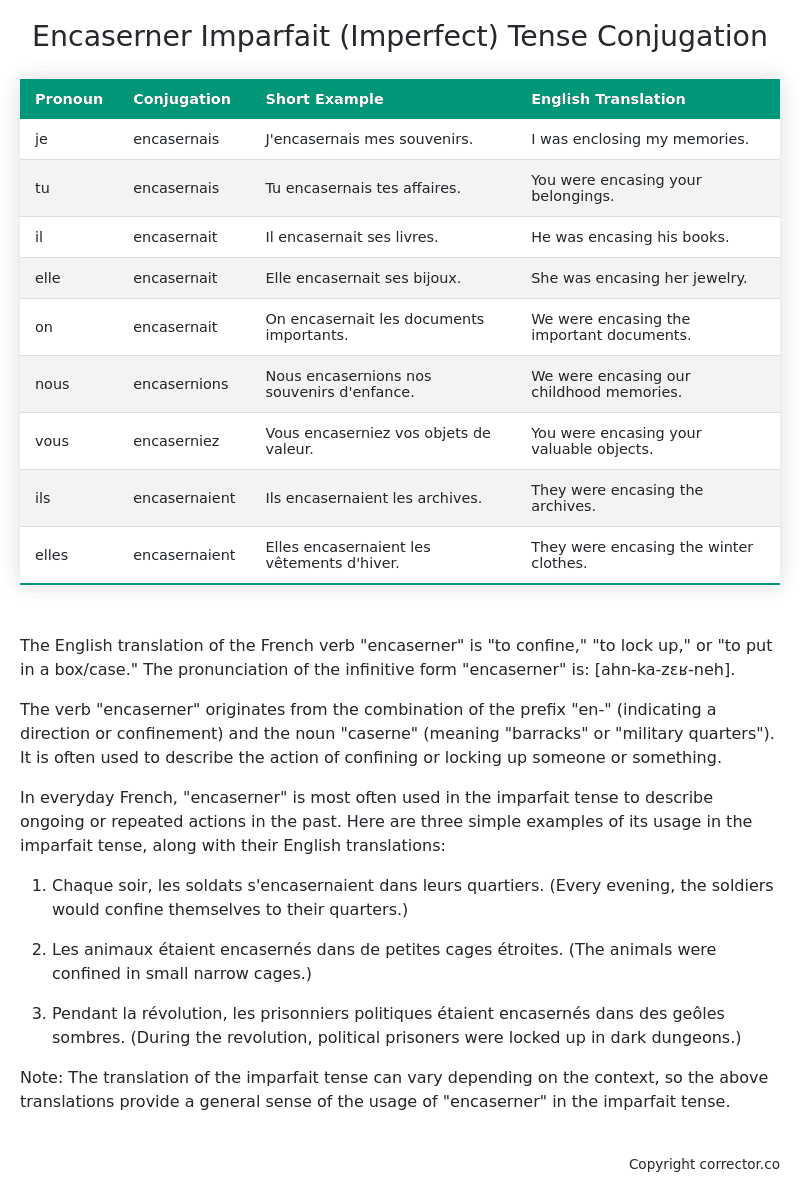Imparfait (Imperfect) Tense Conjugation of the French Verb encaserner
Introduction to the verb encaserner
The English translation of the French verb “encaserner” is “to confine,” “to lock up,” or “to put in a box/case.” The pronunciation of the infinitive form “encaserner” is: [ahn-ka-zɛʁ-neh].
The verb “encaserner” originates from the combination of the prefix “en-” (indicating a direction or confinement) and the noun “caserne” (meaning “barracks” or “military quarters”). It is often used to describe the action of confining or locking up someone or something.
In everyday French, “encaserner” is most often used in the imparfait tense to describe ongoing or repeated actions in the past. Here are three simple examples of its usage in the imparfait tense, along with their English translations:
-
Chaque soir, les soldats s’encasernaient dans leurs quartiers.
(Every evening, the soldiers would confine themselves to their quarters.) -
Les animaux étaient encasernés dans de petites cages étroites.
(The animals were confined in small narrow cages.) -
Pendant la révolution, les prisonniers politiques étaient encasernés dans des geôles sombres.
(During the revolution, political prisoners were locked up in dark dungeons.)
Note: The translation of the imparfait tense can vary depending on the context, so the above translations provide a general sense of the usage of “encaserner” in the imparfait tense.
Table of the Imparfait (Imperfect) Tense Conjugation of encaserner
| Pronoun | Conjugation | Short Example | English Translation |
|---|---|---|---|
| je | encasernais | J’encasernais mes souvenirs. | I was enclosing my memories. |
| tu | encasernais | Tu encasernais tes affaires. | You were encasing your belongings. |
| il | encasernait | Il encasernait ses livres. | He was encasing his books. |
| elle | encasernait | Elle encasernait ses bijoux. | She was encasing her jewelry. |
| on | encasernait | On encasernait les documents importants. | We were encasing the important documents. |
| nous | encasernions | Nous encasernions nos souvenirs d’enfance. | We were encasing our childhood memories. |
| vous | encaserniez | Vous encaserniez vos objets de valeur. | You were encasing your valuable objects. |
| ils | encasernaient | Ils encasernaient les archives. | They were encasing the archives. |
| elles | encasernaient | Elles encasernaient les vêtements d’hiver. | They were encasing the winter clothes. |
Other Conjugations for Encaserner.
Le Present (Present Tense) Conjugation of the French Verb encaserner
Imparfait (Imperfect) Tense Conjugation of the French Verb encaserner (You’re reading it right now!)
Passé Simple (Simple Past) Tense Conjugation of the French Verb encaserner
Passé Composé (Present Perfect) Tense Conjugation of the French Verb encaserner
Futur Simple (Simple Future) Tense Conjugation of the French Verb encaserner
Futur Proche (Near Future) Tense Conjugation of the French Verb encaserner
Plus-que-parfait (Pluperfect) Tense Conjugation of the French Verb encaserner
Passé Antérieur (Past Anterior) Tense Conjugation of the French Verb encaserner
Futur Antérieur (Future Anterior) Tense Conjugation of the French Verb encaserner
Subjonctif Présent (Subjunctive Present) Tense Conjugation of the French Verb encaserner
Subjonctif Passé (Subjunctive Past) Tense Conjugation of the French Verb encaserner
Subjonctif Imparfait (Subjunctive Imperfect) Tense Conjugation of the French Verb encaserner
Subjonctif Plus-que-parfait (Subjunctive Pluperfect) Tense Conjugation of the French Verb encaserner
Conditionnel Présent (Conditional Present) Tense Conjugation of the French Verb encaserner
Conditionnel Passé (Conditional Past) Tense Conjugation of the French Verb encaserner
Conditionnel Passé II (Conditional Past II) Tense Conjugation of the French Verb encaserner
L’impératif Présent (Imperative Present) Tense Conjugation of the French Verb encaserner
L’impératif Passé (Imperative Past) Tense Conjugation of the French Verb encaserner
L’infinitif Présent (Infinitive Present) Tense Conjugation of the French Verb encaserner
L’infinitif Passé (Infinitive Past) Tense Conjugation of the French Verb encaserner
Le Participe Présent (Present Participle) Tense Conjugation of the French Verb encaserner
Le Participe Passé (Past Participle) Tense Conjugation of the French Verb encaserner
Struggling with French verbs or the language in general? Why not use our free French Grammar Checker – no registration required!
Get a FREE Download Study Sheet of this Conjugation 🔥
Simply right click the image below, click “save image” and get your free reference for the encaserner imparfait tense conjugation!

Encaserner – About the French Imparfait Tense
NOTE: To take a deep dive into all the French tenses then see our article on Mastering French Tense Conjugation.
Formation of the Imparfait Tense
For regular -er verbs:
For regular -ir verbs
For regular -re verbs
Common Everyday Usage Patterns
Description of Past Habits
Background Information
Mental and Emotional States
It’s employed to express emotions, thoughts, or physical sensations in the past. For example: “J’étais content quand il est arrivé.” (I was happy when he arrived.)
Ongoing Actions
Points to Note About the Imparfait Tense
Passé Composé vs. Imparfait
Conditional
Si Clauses
Narration
I hope you enjoyed this article on the verb encaserner. Still in a learning mood? Check out another TOTALLY random French verb imparfait conjugation!


